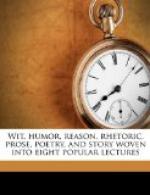“Well,” said the friend, “I don’t see any three good things in that.”
“Ye don’t! Didn’t I dry the woman’s tears, didn’t I save the baby’s soul, and didn’t I get rid of a ten dollar counterfeit bill and get eight good silver dollars in return?”
That is what prohibition of the saloon does for a community. It dries woman’s tears, saves human souls, gets rid of a counterfeit business and puts good business instead.
Is it a counterfeit business? It has been well said, “Go into the butcher stall and you get meat for money, into the shoe store and you get shoes for money, but go into the saloon and the bargain is all on one side. It’s bar-gain on one side and bar-loss on the other; ill-gotten gains on one side, mis-spent wages on the other, a mess of pottage on one side and the birthright of some mother’s boy on the other.”
A great wail is going up from the advocates of the liquor traffic that statewide prohibition means the destruction of immense vested interests and dire results will follow.
“This our craft is in danger,” has ever been the cry against reforms or changes in civilization since the “Shrine Makers of Ephesus.”
When slavery was abolished it was said: “This means ruin to the South! Such a confiscation of property, with every slave set free to beg at the white man’s gate, crushes every vestige of hope, and five hundred years will not bring relief.” Only fifty years have passed and the South is richer than ever in her history.
Justice Grier of the Supreme Court said: “If loss of revenue should accrue to the United States from a diminished consumption of ardent spirits, she will be the gainer a thousandfold in health, wealth and happiness of the people.”
If this is true, then this question is not only a great moral question but also a tremendous economic problem.
If production should be for use and not for abuse, the existence of breweries and distilleries are without excuse.
If one should be rewarded on the basis of service, the saloon keeper has no claim for even tolerance, much less reward.
If labor is the basis of value, men who live by selling liquor to their fellowmen are leaches on the body politic, and Ishmaels in the commercial world.
The claim that the liquor business is a benefit to a community or to the country is in harmony with the assertion that war is a “biological necessity” and a “stimulating source of development.”
General Sherman said: “War is hell.” Certainly the one now raging between the leading nations of the old world is a hell of carnage. And yet intemperance has destroyed more lives than all the wars of the world since time began. It has added to the death of the body the eternal death of the soul and then the sum of its ravages is not complete until is added more broken hearts, more blasted hopes, desolate homes, more misery and shame than from any source of evil in the world. If what Sherman said of war is true, and the liquor curse is worse than war, how can this government hope to escape punishment for raising revenue from a business so abominable and wicked?




